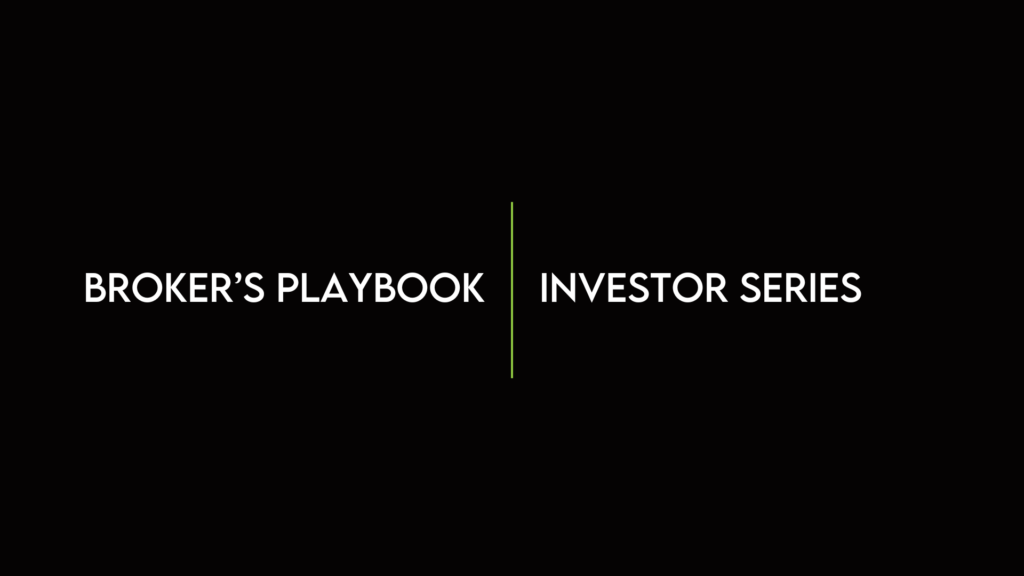Welcome to Broker’s Playbook! Today we have a special guest, Ron Sally from Remax Millennium. He started in the business years ago and is now one of the youngest superstars in the entire Remax network globally. Find out how he went from agent to broker owner at only 25, and get an inside look at his career journey. This unique episode will give you all the advice and tips you need to know when starting out in the business.
Simeon Papailias: Welcome back once again to another episode of Broker’s Playbook. Today, I have the unique pleasure of having one of my very close friends on the show, and he is one of the youngest superstars across the entire Remax network globally. I have Ron Sally from Remax Millennium, a guy who started in the business years ago, broker owner by 25 and now he just hit his big 30. Welcome to the show, Mr. Ron Sally.
Ron Sally: Thank you for having me, man.
Simeon Papailias: Mr. Remax Millennium.
Ron Sally: Thank you so.
Simeon Papailias: Much. Um, your brokerage is very, very well known as a pioneer in the industry. What I wanted to do today is. From the over 60 or 70 episodes that that we’ve done for Broker’s Playbook. We’ve we’ve become a resource to agents to kind of know where things are at, what’s going on, where to get help, how to get help, how to do all these things. I’ve never touched on the broker owner. I’ve never touched on the broker owner. And what I want to bring today is we’ve talked about teams a lot. Like when, when do you know you want to start a team? When? What’s the right team model? Well, what about starting a brokerage? We’re not talking about that. Teams went on a crazy ride up, so the agent. Most agents aren’t even considering what life could be like. On being a broker owner. Welcome to the show. Start anywhere, my man.
Ron Sally: Look, first off, you made a very incredible point. Any time someone has ever gotten their license, they’ve had a thought in their mind or in their brain where they wanted to have their own brokerage. Just like that, I had that little bit of bug inside me where I said, you know, one day I want to have my own operations. And having your own operations usually stems from, you know what, I think I can do it better. I’m seeing somebody else run something. I’ve been part of multiple brokerages. I’m seeing the operations. I want things to be done this way. I want things to be done that way. Why don’t I just do it myself? And that’s the first thought that comes to everyone’s mind. First off, I realized early on that when I did jump into it that this is not for everyone and even myself. When I threw myself into the role of broker owner, I said, okay, cool, I’m Mr. Hotshot now. I’m broke a record. But what does that mean? It doesn’t mean jack shit. First off, why do you want to be broker owner? What is it going to do for you? Or what is it going to do for everyone else? Because really, what you are is you become a large mentor to your community and your brokerage. And now you have the responsibility of breeding the next set of agents in the industry, whether they’re seasoned. Whether they’re brand new agents coming off just from their course, you have a major responsibility to make sure that they adhere to the rules, the responsibilities, the ethics of the trade of real estate.
Simeon Papailias: And also you’re responsible in leading in shaping the industry when you’re at the top of an organization, because what you deem acceptable as practices is what they are going to keep pushing the envelope on, etcetera. And we all know and we’ve all heard of a million different bad practices agents do. But we also because of social media, we get to see firsthand all the amazing things agents do. Yeah, in my opinion, agents have become leaders in their successful agents have become leaders in their communities. Yes. And I define success very simply, not by money, but by the respect that community bears against any service provider. There is car dealers who are heroes in the world. So many because they support their philanthropists. They lead the community. They want better. Agents have found themselves now in a place of the world where they. If you want to penetrate a community, you have to give to the community. You have to. You can’t fake it. You can’t. There’s no two ways about it. When you’re leading hundreds of agents every day. Where do you start? Where is your. You enjoy. And I know you do, because I’ve been to many events at your brokerage. As a guest, you enjoy a tremendous culture. Where does one begin to evaluate or how to create culture within an organization?
Ron Sally: You first have to start off with asking yourself a question. If I was an agent and I was to join an organization, what does that look like for me? What are my expectations from the organization that I want to be a part of? And for everyone? That’s going to be very different. For some people, it’s training, for some people, it’s events. For some people, it’s resources. For some people, it’s access to the leadership. For some people, it’s availability. Each person or amenities within an office, each person is going to have their different requirements of what they want for their business. So the first set up of the culture that we talk about is asking yourself, what do I want to create? And what is going to make the best platform for agents to harness the culture? What is culture? At the end of the day, it’s a community of like minded individuals that want to operate a certain way, that think a certain way, that want to be a certain way. And that’s the culture, whether it be clothes. What do you think.
Simeon Papailias: Defines the culture at Remax Millennium in your brokerage?
Ron Sally: Being better than we were yesterday.
Simeon Papailias: So consistent improvement.
Ron Sally: Consistent improvement. Availability. I would also say exposure. Exposure has been a very big critical success to our organization, where we’ve really exposed our agents to things that they generally wouldn’t have the opportunity to have in the first place.
Simeon Papailias: That’s incredible. And what kind of feedback do you get, for example, like, of course you get complaints. We all like I have a large team. We’re part of the one of the biggest franchises in Canada. Yeah. And there’s always complaints and there’s always issues from positive feedback. What would you say the number one positive feedback that keeps you going is from your agents.
Ron Sally: Making sure that they are progressing, and if they are finding success with the services you’re providing, if they’re not providing, if they’re not achieving success or results or having growth in their business from the services you’re providing it, then then there’s no point of what you’re doing. That means it’s a it doesn’t work.
Simeon Papailias: And what kind of test do you. So let’s say there are agents and I mean, I’m one of those agents. I have given it much thought many times to start my own brokerage or to pick up a franchise, etcetera. And and I can I will also share why I haven’t, for example. But every time I gauge, is that something for me? Do I want to do that? The questions that I ask myself is, do I believe enough in the business model of brokerage? What is those critical, the critical, the KPIs that you can make a decision on that. Because if you’re not practicing sales of real estate, the margins and the business of real estate brokerage is a world apart of real estate sales. Absolutely like nothing to do with each other. Yeah. When you’re making decisions. To lead your agents to success. What technologies to provide? What to invest in? How do you make those decisions? What do you consider?
Ron Sally: I look at it that if an agent was to use something in their business, whether it be a CRM, whether it be marketing resources, whether it be having access to opportunities, a lot of times you have to go outside of their organization to find it. Most operations, from what I’ve realized, offer three basic things. If they do at least. And one of those things starts with a brand if it exists. Number two support. How do you really, truly define support in the first place? A support availability, a support, resources or support? Having three girls sit in the front and pick up phone calls. How do you or having a few tables and chairs within an office? How do you generally, you know, explain what that support looks like? It could have many meetings and the third is training. Every operation says, oh, we do trainings, we give you support and we have a brand. Oh, and we have X amount of location, X amount of agents. Okay, cool. Fantastic. That’s great for the brokerage. What does that do for the agent. So the biggest question to ask is what is your brokerage doing for you.
Simeon Papailias: So you use adaptation. So if you’re going to invest in new technology the first thing you consider is how many will use it and why exactly.
Ron Sally: And is it actually going to be helpful, or is it just a BS stuff that people just put into place? And here you go. Here, use this. The newest trend or the newest trend or the newest thing. Is it actually what are actually people utilizing in their business and what do they need are the most all the time we’re looking at the new shiny objects. What about going back to the basics to see this is what people actually need, and how can we make that process a little bit faster? How can we make it a little bit better?
Simeon Papailias: Well, one of the best things I remember last year we were sitting down masterminding and what are you doing? What are we doing? Etcetera. Which that’s a quick tip to all our entire audience. If you’re not meeting with your your colleagues and masterminding on what they’re doing and sharing what you’re doing, you’re going to be dead in the water because you need to know. You need to rub off on each other. You need to advise and counsel each other. So and I remember you had developed a platform, a tech platform proprietary to your office. Yes. That offered instead of layering the whole office with 50 bucks a month more in fees to access technology, you made a la carte options. So if you need this technology, you pay for it. If you don’t need it, you don’t, which you don’t incur extra expenses and therefore you don’t have half the office sour at you for implementing charges, and the other half saying, you know, crying foul. I thought that was brilliant. How did that turn out?
Ron Sally: It turned out fantastic. And the greatest example I like to use for that. And any time I sit down with somebody, I said, think of it like a five star hotel resort. Now if you want room service, it’s available. Will it come at an extra cost? Yes, but the second you need it, it’s there versus it not being there. You want to play golf? Golf is available. It’ll come at a separate cost. But if you don’t need to play golf, you don’t have to play golf. You have the general amenities which are free, which you can use, the swimming pool, the gym, the space you get a chance to enjoy. But all the extra stuff, even restaurants that you need to go to as using the resort example, you can use it at a separate cost. So having said that, what we did was we created our model, which we said, you know what’s important to have in a brokerage in-house? Everything. Generally, most agents will outgrow their brokerage because it’s the same stuff over and over and over and over again. How do I stop anybody from outgrowing their brokerage? And that’s why we created models in our organization such as in-house marketing, in-house pre-construction and house mortgage, our training academy, two events, two parties to get together to administration services, provided we do all the administration for the agents and then backed up by one of the largest brands in the industry. Not only that, our back end tech platforms, which allow you from your phone to access resources as you need them, or you go to your desktop portal.
Simeon Papailias: I mean, and I will say this a million times, because any of the serious players in this business offer cutting edge tech, and they’re all we are all investing in them. I know that like I’m a Royal LePage or you’re with Remax, I know what Royal LePage is investing in. I know what Remax is investing in. And this isn’t it’s for me, like maybe the brands can be competitive. I have zero. Yeah. Because like, I could be at Remax tomorrow and I would still do what I need to do. Exactly. Royal LePage said it’s a matter of finding, in my opinion, 99% of it all is culture. Where do you fit in? Yeah, and you should always choose. Not the top brands, the top people. There’s a reason, for example, in my opinion, that Royal LePage has attracted me. There’s a reason Remax has attracted you. There’s a a reason century 21 has Tony. And so like the top people, whatever the brand is, are always going to be top people, but they make the brand because that brand may foster the values that you have. Right. So. I think where I want to go with this is if you’re going to be considering becoming a broker owner, and you dropped kind of and maybe we’ll run through how you actually did it. But we ran through some of your top considerations of what you invest in, the type of culture that you foster, why you foster that culture because you believe in never ending improvement, which is one of my founding principles of kaizen.
Ron Sally: Yeah. Kaizen.
Simeon Papailias: Yeah. It’s to move forward. So I get it. I want people to be able to understand that those are not by coincidence. They’re not by chance. Those considerations. If you want to succeed and you start in Vaughan now, you went to Brampton. And I know as a fact that you’re going to continue to grow. And of course, I wish you success for anybody considering broker owner as their future. Those are absolute key, are they not?
Ron Sally: I agree with you. I agree with you. And I think more than anything, if anybody was to right now start their own brokerage, the biggest question to ask yourself is why? Number two, what are you doing for others? Don’t think about what you’re doing for yourself. What are you doing for others? Number three does your model actually work? You got to have a model in the first place. What is your brokerage about? Or are you generally just doing what everybody is doing? Because if everybody is doing, then you fall in a mainstream level of cool. They’re also offering the same thing. They’re also offering the same thing. How do you set yourself apart? Number four, the most important aspect of it all is is your model or your business plan that you have. Is this sustainable? Can you actually afford to carry it out? As the beast grows? Can you afford to provide large level of services? For example, a lot of times when people start their brokerage, the first thing they start off with is what we give you free leads. We give you free leads. Free leads. Come join us. Free leads. You’ve seen it more than ever altogether. Now ask yourself if you’re running a successful team of the leads that are being provided. Maybe when you have five people, it’s easy to manage. You have ten people? Sure, 15. Okay. But when you’re growing your brokerage and you get to 80 people or 90 people or 100 people, can you afford to actually hand out that many leads on a consistent level? And how can you measure the closing ratios of all those leads that are being provided? So right away your model falters through.
Simeon Papailias: Well, you just hit the biggest KPIs for for teams, which is leads in conversion out. And on a scalability basis. It is not for a brokerage, it is not the way to succeed. And that’s simply because not everybody is committed to converting in success. Yeah. So your top ten percentile will not be able to close because they simply are not made for real estate. They just don’t know it yet. Exactly. So you can’t keep giving paid leads to people that can’t close because that’s how your ship will sink.
Ron Sally: And then the other thing is, when you start a company, don’t try to be someone that you’re not. If you don’t have it, you tell them that you don’t have it. And this is a service that you don’t offer. And it’s because of that. I openly say to agents that this is a service that we don’t offer because we don’t operate that way. What you’re looking for is more of a team setup. If you would like a team setup, we have teams within the office, or I know some great individuals like Simeon and the rec team, that I think you should reach out to them and maybe see if that if you’d be a fit for for their organization. So having said that, everybody’s models are going to work very differently for someone that’s very important. Like for you, you said culture is the biggest thing of all. For me that’s the same thing. So that’s why we’re we’re aligned together. Now for someone else, it may not be the case. I’ve had agents sit there. I don’t need anything from you. All I need is just the brand. And I just need a space to sit out of work of. And don’t bother.
Simeon Papailias: Transactional.
Ron Sally: They’re transactional. And for them, that’s great. I have an agent in my office. Never bothered me once. Top producer every single year. Does his own paperwork. Does everything. If I could replicate 101 of those people, I would have wanted to replicate it. He does not need any. He just needs an office to sit out of. And he’s the most pleasant individual. And and he and he gets it done. No.
Simeon Papailias: There’s different. And that’s not a typical profile of the transactional agent. Exactly. He’s an exception and God bless him. But I personally don’t encourage anybody to be transactional. I don’t encourage, you know, I just want to be left alone. I’m a hermit. I just want to do my business because that’s not not because there’s anything wrong with it, but because it’s not long lasting. As a human being, we’re social creatures to begin with. There’s only so long you can bang out 80 calls a day, closed in a room before you need more human interaction. You need relationship. You need bond. You need relationship. You just need relationship. Yeah. And when we’re talking about going from agent to team to broker owner, for example, unless you value loyalty and relationship, you’re going to have a very hard time. A very hard time. Ron, I love these insights. I don’t want to finish this episode. I want the next 5 to 10 minutes. Give me a play by play of, let’s call it your five years as a broker owner. How did it start? Was this a family affair? Do you have a partner? Give me a play by play. What, the last five years?
Ron Sally: Yeah, absolutely. So I started it from scratch. My partner, who is my father, which is Sunil, initially didn’t want to start the office, and I said, I’m going to go ahead and I’m going to do with it and actually to sit them down like, look, if I’m going to do this, either you come with me or you step aside and let me do this on my own and the way I want to do it. And then we had a conversation and he says, okay, fine. If we’re going to do it, we’re going to do it right. And initially when I first started, I said, you know what? My I’m too young. I’ve never seen a young broker of record. I think you should be broker. He’s like, no, no, no, no, no. He goes, you wanted to do this? He goes, I’m partnering with you. But this is your responsibility. It could be your baby. It’s your baby. I don’t want to be broker. I don’t want any sense of responsibilities. I could be doing anything. I want to handle my own operations on my own side. But this is your baby. So I said, okay, no problem. So that’s how I became broker record, and I started. Driving things moving forward. What I focused on was this the first thing if you’re going to buy a product today off Amazon online, what’s the first thing you look at? How many other people have bought it? What are they saying about it? Does it actually work? Is a quality good? Does it have any faults into it? Is there a need for this product? Does it? Is it revolutionary? These are the questions that you ask when you’re buying any kind of product online.
Ron Sally: And how many times have we bought items off of Amazon? Let’s use that as an example because I’m very guilty of it. Same freaking product. But I paid $5 more because the views were higher, reviews were higher. You’ve probably done the same thing because you don’t know you’re seeing the other side up there, but you’re like, man, the reviews aren’t degraded, but it’s the same product. I think maybe that product is trashy, but this one’s a little bit better. And you would pay the $5 more and you would buy that. So the first thing I did was I said social proof. People need to see what’s happening in my organization. Most brokerages fail because you don’t know what the heck is happening in that organization. They’re large. They have a bunch of agents. Okay, cool. But you only get a chance to see it when you go in for a meeting. How do I close you or how do I sell you? Or how do I show you how great the organization is? Before you walk through my doors, I want to what is what is longetivity in the business? Having people wanting to join you before you even come in. Altogether, they’re pre-sold.
Simeon Papailias: Which is the exact formula that we use as content creating real estate agents. My clients know me way before they ever meet me in person. They know what I stand for. They know what they’re going to expect as an experience. So you took what actually works in every business, not just real estate, and applied it to the brokerage world.
Ron Sally: Exactly.
Simeon Papailias: I absolutely love it.
Ron Sally: So started with Google reviews, made sure our Google reviews grew right off the bat. We could say I used an example. I said, look at all the other brokerages you’re interviewing. Where are the Google reviews? How can I teach you to do the same things if I can’t do it myself? How can I teach you to be a better agent if I can’t be a better broker myself? How can I teach you to go out and market and promote and advertise yourself to generate business? If I can’t do it myself. So I’m leading by example and I’ll tell me out of the brokerages you’re interviewing, which broker is leading by example. And I go silent and I sit back, so what am I doing?
Simeon Papailias: I’m questioning it’s too easy.
Ron Sally: None so. So just like too easy. So what ends up happening is so now social proof is the other thing. Then the other thing is how do you drive the culture? The culture comes with people collaborating together. Now if somebody lives 30 minutes away, another person lives 45 minutes away, another person lives 20 minutes away. And there’s some people that may live an hour away, depending on where they are, but they want to stay with the organization. You need to give them a reason to come in and attend an event, or come together to meet other agents altogether. You remember the old days, and when I say by the old days, I mean I’m talking about pre-COVID. Like being in the office was the most important thing that you can possibly think of. I would daily be in the office, and that’s where we learn from other agents. We spoke with other agents, we connected at the coffee counter, we connected at just hanging out and not doing something all day at the office and just having a simple conversation about business and vibing with another agent. And you’re like, wow, I’m seeing this person is getting this many listings, or they’re doing all these sales. I picked up 1 or 2 points that now I can implement in the business. But then when Covid ended up happening, people had to operate from home. And the way the business model is changed, but now it’s coming back.
Ron Sally: Where I’m seeing more and more agents now are coming into the office because it’s very important. So social proof is one of the biggest things I’ve worked on as an organization. The second thing I ask myself as a leader, I do not want to be the general in the back. I want to be on the ground floor in battle with my people. So I’m in battle with my people. I don’t make sales directly myself, but I help them close and convert transactions. I don’t know how many other broker owners do that, but I’m in battle with them fighting that same battle of being a better agent tomorrow. So I am not. What what happens over a period of time is broker owners. Because they’re not in the field. They lose touch of the field. They lose the touch of the problems that an agent is facing. Like how many like, imagine having an agent going on so many listing appointments and not being able to close them. So frustrated. And then a broker owner is like, oh, the last listing appointment I went on was 15, 20 years ago. You know what I mean? So you want to be in the battle with your agents? That’s the other thing I focus on. I said, I’m going to be in the battle with my agents as long as I can be in the well.
Simeon Papailias: I believe in servant leadership is the term I would use to to kind of describe what you’re describing and servant leadership in. Again, we’re aligned on many levels, which is kind of why we’re we’re both speaking in parallel. But it is important for anyone considering leading today, 2023. Barking orders or telling people what to do is not effective. Yeah, nobody cares about you telling them what to do. They don’t want to be told what to do. They either want proof of what to do. Like, don’t just talk about it. Show me. Show me your results show. There’s a million. Maybe the internet ruined it because there’s so much fakeness out there. But as a leader, I know the only time I close people meaning whether they join my team, join our brokerage, whether I sell real estate is always when I am able to properly. Convey. Proof of exactly what you’re talking about. So if you are the leader and your listing agent has not been able to convert ten listings and you haven’t sold real estate in 15 years, you’ve got a problem. Either you need to bring him into a mentorship program, or whether you are so in touch with what’s happening, you’re not going to keep that agent. That agent needs value help now. Exactly. So you find yourself in the trenches, and this is something that you feel is giving you an edge.
Ron Sally: Absolutely. And the other big factor is the services that you provide as a brokerage level generally cannot be BBS services. They have to solve a problem. And that problem of an agent is usually what time, money, resources and opportunities. How can you create opportunities for the agent to do more transactions? How can you take time off their plate by handling back end? Maybe it’s marketing, maybe it’s administration, maybe it’s other aspects of their business. What can you do to take that leverage off so they can focus on what servicing their clients in a greater way. And then the other big thing altogether is being available for them. Now what happens is when you have started, when you’re starting as a broker owner, you have more time to give. As you grow as a broker owner and you start hiring agents, like the way I have, your time becomes limited. So now you have to create a stronger organization where you have enough people that can also be helpful. Your right hands, your left hands that feel the same way about your organization. Foreign. So anybody that wants to start a brokerage right now, that’s probably watching this podcast and is thinking that, can I be broker owner? Yes, you can be broker owner.
Ron Sally: But ask yourself, why do you want to be broker owner? What could you do to solve a problem that doesn’t exist today, or a problem that exists today that you can solve? And the other big thing is, how can you create a sustainable business for yourself? Because in order to provide those services to these agents, they come at a cost. So how do you how do you generalize the cost? So you’re also able to feed the beast and make money, because this is the work that I do. In order for me to get a certain healthy return, I am able to invest more into the organization. If you as a brokerage is not making money, how are you going to continue to put funds in for other agents? And that’s what agents don’t understand. So when you go to an office that says, oh, well, my my fees are next to nothing or my splits are next to nothing, no problem. You as a brokerage have to be able to justify the splits or the fees or the services based on the services that you provide. You have to be able to.
Simeon Papailias: Justify it and what it comes down to. And again, it’s value proposition 100% for the agent. I mean, looking at the GTA because we have an audience at this point that’s kind of global throughout North America, for sure, is 80% of our audience. But like right here, like we’re based out of the Greater Toronto Area and there are brokerages. I’m not going to call them discount brokerages, but there’s different broker models. There’s brokerages that don’t offer frills, meaning full value marketing departments, administration support, nothing for the agent. And they’re one of the biggest brokerages in Canada, by the way, and they’re called right at home. Yeah, this isn’t an advertorial for anyone, nor is it slamming it. I think right at home is one of the most brilliant. Brokerages ever. They attracted the agent who is either part time, who is not going to be changing the world with their team, potentially because they don’t need the support or they have their own way of doing things, and all they want is that real estate process to be able to get through the paperwork with trust accounts and everything else. So if you are that person, right at home is a brilliant model that attracts you.
Simeon Papailias: If you’re looking for full service, support all the bells and whistles. Access to staging. Access to all the millions of things that now exist that brokerage will not work for you. You’ll have to look at the other brands or create your own. Yeah, I think we’ve done I think we’ve done a good job today. I feel good with the topics we covered. To all my brothers and sisters in the business, Ron Sally is one of the most humble broker owners involved, broker owners in the business. I again, I’ve said this a million times. Brands mean nothing to me. People mean everything to me. He would take a call from anyone. If you have questions, please hit us by email at Community of Brokers playbook.com. If you want to go direct, by all means do. But he’s a busy man. It’s Ron Sally and he’s with Remax Millennium. Google it. You can find him on all his socials and of course on all the links below you’re going to find all of Ron’s information. Ron, I want to thank you so much for coming on to the show, dropping and sharing all your insight. We appreciate you, my man.
Ron Sally: Thank you for having me. It’s been an absolute pleasure. Awesome. We’ll see you soon. Thank you.








